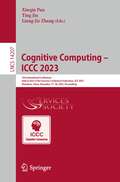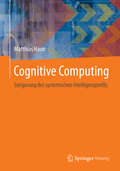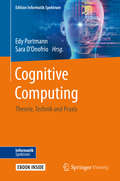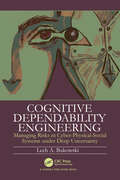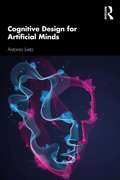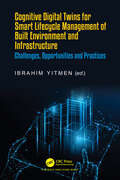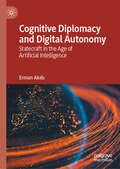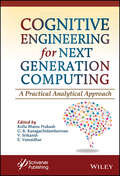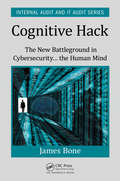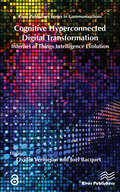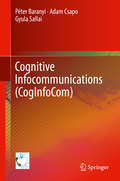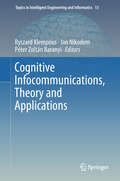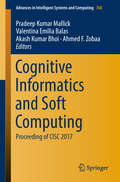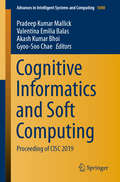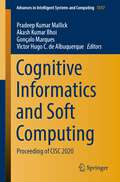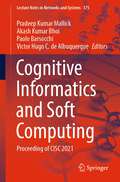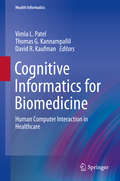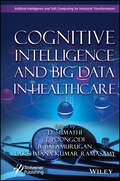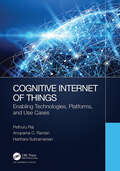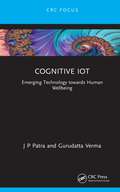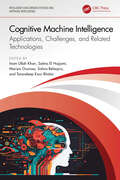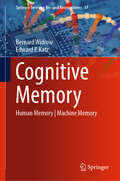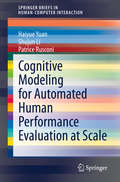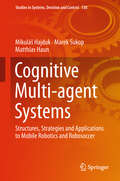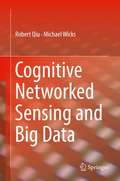- Table View
- List View
Cognitive Computing – ICCC 2023: 7th International Conference Held as Part of the Services Conference Federation, SCF 2023 Shenzhen, China, December 17-18, 2023 Proceedings (Lecture Notes in Computer Science #14207)
by Liang-Jie Zhang Xiuqin Pan Ting JinThis book constitutes the refereed proceedings of the 7th International Conference on Cognitive Computing, ICCC 2023, held in Shenzhen, China, during December 17–18, 2023.The 9 full papers in this book were carefully reviewed and selected from 14 submissions. They are organized in topical sections as follows: Cognitive Computing Technologies and Infrastructure, Cognitive Computing Applications, Sensing Intelligence, Cognitive Analysis, Mobile Services, Cognitive Computing on Smart Home, and Cognitive Computing on Smart City.
Cognitive Computing: Steigerung des systemischen Intelligenzprofils
by Matthias HaunZiel des Buches ist, artifizielle Systeme als kognitive Modelle und damit als wissensbasierte Agenten zu konzeptionalisieren und diese Agentenmodelle durch rechnerbasierte Technologien in prozessualer und funktionaler Hinsicht zu kognitiven Probleml#65533;sungssysteme auszugestalten. Das Ziel eines solchen Ansatzes liegt in der Steigerung des systemischen Kognitionsquotienten solcher Systeme. Erreichbar wird dieses Ziel durch die Konzeptionalisierung von Modellen auf Basis einer Kognitionstheorie, der (Aus)implementierung dieser Modelle durch den Einsatz der Cognitive Computing Technologie unter Verwendung der Programmiersprache Java und der Validierung dieser L#65533;sungen im Rahmen von Simulationen. Das Buch wendet sich gleicherma#65533;en an Studierende, Fachleute aller Fachrichtungen als auch den interessierten Leser. Indem die einzelnen Kapitel einen Br#65533;ckenschlag zwischen Standardwissen und Wissen aus Nachbargebieten, wie Kognitionswissenschaft oder Informatik darstellen, versucht dieses Handbuch ein tiefgreifendes Verst#65533;ndnis des komplexen Themengebietes ,,Artifizielle Kognition" zu erm#65533;glichen und dabei dennoch voraussetzungsfrei lesbar zu bleiben.
Cognitive Computing: Theorie, Technik und Praxis (Edition Informatik Spektrum #63)
by Edy Portmann Sara D'OnofrioMit diesem Buch führen die Herausgeber den Begriff „Cognitive Computing“ ein. Unter Cognitive Computing werden verschiedene Technologieansätze wie künstliche neuronale Netze, Fuzzy-Systeme und evolutionäres Rechnen zusammengefasst mit dem Ziel, die kognitiven Fähigkeiten eines Menschen (Denken, Lernen, Schlussfolgern etc.) mithilfe von Computermodellen zu simulieren. Nebst den theoretischen Grundlagen widmet sich das Herausgeberwerk der Vielfalt verschiedener Anwendungsmöglichkeiten und zeigt erste Erfahrungen aus Pionierprojekten. Das Buch richtet sich gleichermaßen an Studierende, Fachleute aller Fachrichtungen sowie den interessierten Anwender. Es hilft dem Leser, die Bedeutungsvielfalt des Begriffs Cognitive Computing zu verstehen und verschiedene Einsatzmöglichkeiten im eigenen Umfeld zu erkennen und zu bewerten.
Cognitive Dependability Engineering: Managing Risks in Cyber-Physical-Social Systems under Deep Uncertainty
by Lech BukowskiThe work is a context-oriented analysis and synthesis of complex engineered systems to ensure continuous and safe operations under conditions of uncertainty. The book is divided in four parts, the first one comprises an overview of the development of systems engineering: starting with basics of Systems Science and Single Systems Engineering, through System of Systems Engineering to Cognitive Systems Engineering. The Cognitive Systems Engineering model was based on the concept of imperfect knowledge acquisition and management. The second part shows the evolutionary character of the dependability concept over the last fifty years. Beginning from simple models based on the classical probability theory, through the concepts of tolerating faults, as well as resilience engineering, we come to the assumptions of Cognitive Dependability Engineering (CDE), based on the concept of continuous smart operation, both under normal and abnormal conditions. The subject of the next part is analysis and synthesis of Cyber-Physical-Social (CPS) Systems. The methodology consists of the following steps: modeling CPS systems' structure, simulating their behavior in changing conditions and in situations of disruptions, and finally assessing the dependability of the entire system based on CDE. The last part of the work answers the question of how to deal with risks in CPS systems in situations of high level of uncertainty. The concept of a Cognitive Digital Twin was introduced to support the process of solving complex problems by experts, and on this basis a framework for cognitive dependability based problemsolving in CPS Systems operating under deep uncertainty was developed. The possibilities and purposefulness of using this framework have been demonstrated with three practical examples of disasters that have happened in the past and have been thoroughly analyzed.
Cognitive Design for Artificial Minds
by Antonio LietoCognitive Design for Artificial Minds explains the crucial role that human cognition research plays in the design and realization of artificial intelligence systems, illustrating the steps necessary for the design of artificial models of cognition. It bridges the gap between the theoretical, experimental and technological issues addressed in the context of AI of cognitive inspiration and computational cognitive science. Beginning with an overview of the historical, methodological and technical issues in the field of Cognitively-Inspired Artificial Intelligence, Lieto illustrates how the cognitive design approach has an important role to play in the development of intelligent AI technologies and plausible computational models of cognition. Introducing a unique perspective that draws upon Cybernetics and early AI principles, Lieto emphasizes the need for an equivalence between cognitive processes and implemented AI procedures, in order to realise biologically and cognitively inspired artificial minds. He also introduces the Minimal Cognitive Grid, a pragmatic method to rank the different degrees of biologically and cognitive accuracy of artificial systems in order project and predict their explanatory power with respect to the natural systems taken as source of inspiration. Providing a comprehensive overview of cognitive design principles in constructing artificial minds, this text will be essential reading for students and researchers of artificial intelligence and cognitive science.
Cognitive Digital Twins for Smart Lifecycle Management of Built Environment and Infrastructure: Challenges, Opportunities and Practices
by Ibrahim YitmenThis book provides knowledge into Cognitive Digital Twins for smart lifecycle management of built environment and infrastructure focusing on challenges and opportunities. It focuses on the challenges and opportunities of data-driven cognitive systems by integrating the heterogeneous data from multiple resources that can easily be used in a machine learning model and adjust the algorithms. It comprises Digital Twins incorporating cognitive features that will enable sensing complex and unpredicted behavior and reason about dynamic strategies for process optimization to support decision-making in lifecycle management of the built environment and infrastructure. The book introduces the Knowledge Graph (KG)-centric framework for Cognitive Digital Twins involving process modeling and simulation, ontology-based Knowledge Graph, analytics for process optimizations, and interfaces for data operability. It offers contributions of Cognitive Digital Twins for the integration of IoT, Big data, AI, smart sensors, machine learning and communication technologies, all connected to a novel paradigm of self-learning hybrid models with proactive cognitive capabilities. The book presents the topologies of models described for autonomous real time interpretation and decision-making support of complex system development based on Cognitive Digital Twins with applications in critical domains such as maintenance of complex engineering assets in built environment and infrastructure. It offers the essential material to enlighten pertinent research communities of the state-of-the-art research and the latest development in the area of Cognitive Digital Twins, as well as a valuable reference for planners, designers, developers, and ICT experts who are working towards the development and implementation of autonomous Cognitive IoT based on big data analytics and context–aware computing.
Cognitive Diplomacy and Digital Autonomy: Statecraft in the Age of Artificial Intelligence
by Erman AkıllıIn a world increasingly governed by code, how do states preserve influence, identity, and agency?Cognitive Diplomacy and Digital Autonomy: Statecraft in the Age of Artificial Intelligence explores how artificial intelligence is reshaping the foundations of international relations. From algorithmic negotiation to AI-driven soft power, this book offers a strategic framework; rooted in the triad of presence, practice, and resilience for navigating diplomacy in the digital age. With case studies from the Global South, and beyond, it reveals how emerging powers are crafting new paths to sovereignty and global relevance.Balancing theoretical insight with real-world application, this timely work charts the contours of a new diplomatic era, where cognitive environments matter as much as material ones, and digital autonomy is the new currency of strategic independence.Essential reading for scholars, diplomats, and decision-makers confronting the frontiers of AI and global order.
Cognitive Engineering for Next Generation Computing: A Practical Analytical Approach
by G. R. Kanagachidambaresan Kolla Bhanu Prakash V. Srikanth E. VamsidharThe cognitive approach to the IoT provides connectivity to everyone and everything since IoT connected devices are known to increase rapidly. When the IoT is integrated with cognitive technology, performance is improved, and smart intelligence is obtained. Discussed in this book are different types of datasets with structured content based on cognitive systems. The IoT gathers the information from the real time datasets through the internet, where the IoT network connects with multiple devices. This book mainly concentrates on providing the best solutions to existing real-time issues in the cognitive domain. Healthcare-based, cloud-based and smart transportation-based applications in the cognitive domain are addressed. The data integrity and security aspects of the cognitive computing main are also thoroughly discussed along with validated results.
Cognitive Hack: The New Battleground in Cybersecurity ... the Human Mind (Security, Audit and Leadership Series)
by James BoneThis book explores a broad cross section of research and actual case studies to draw out new insights that may be used to build a benchmark for IT security professionals. This research takes a deeper dive beneath the surface of the analysis to uncover novel ways to mitigate data security vulnerabilities, connect the dots and identify patterns in the data on breaches. This analysis will assist security professionals not only in benchmarking their risk management programs but also in identifying forward looking security measures to narrow the path of future vulnerabilities.
Cognitive Hyperconnected Digital Transformation: Internet of Things Intelligence Evolution
by Ovidiu Vermesan Joël BacquetCognitive Hyperconnected Digital Transformation provides an overview of the current Internet of Things (IoT) landscape, ranging from research, innovation and development priorities to enabling technologies in a global context. It is intended as a standalone book in a series that covers the Internet of Things activities of the IERC-Internet of Things European Research Cluster, including both research and technological innovation, validation and deployment. The book builds on the ideas put forward by the European Research Cluster, the IoT European Platform Initiative (IoT-EPI) and the IoT European Large-Scale Pilots Programme, presenting global views and state-of-the-art results regarding the challenges facing IoT research, innovation, development and deployment in the next years. Hyperconnected environments integrating industrial/business/consumer IoT technologies and applications require new IoT open systems architectures integrated with network architecture (a knowledge-centric network for IoT), IoT system design and open, horizontal and interoperable platforms managing things that are digital, automated and connected and that function in real-time with remote access and control based on Internet-enabled tools. The IoT is bridging the physical world with the virtual world by combining augmented reality (AR), virtual reality (VR), machine learning and artificial intelligence (AI) to support the physical-digital integrations in the Internet of mobile things based on sensors/actuators, communication, analytics technologies, cyber-physical systems, software, cognitive systems and IoT platforms with multiple functionalities. These IoT systems have the potential to understand, learn, predict, adapt and operate autonomously. They can change future behaviour, while the combination of extensive parallel processing power, advanced algorithms and data sets feed the cognitive algorithms that allow the IoT systems to develop new services and propose new solutions. IoT technologies are moving into the industrial space and enhancing traditional industrial platforms with solutions that break free of device-, operating system- and protocol-dependency. Secure edge computing solutions replace local networks, web services replace software, and devices with networked programmable logic controllers (NPLCs) based on Internet protocols replace devices that use proprietary protocols. Information captured by edge devices on the factory floor is secure and accessible from any location in real time, opening the communication gateway both vertically (connecting machines across the factory and enabling the instant availability of data to stakeholders within operational silos) and horizontally (with one framework for the entire supply chain, across departments, business units, global factory locations and other markets). End-to-end security and privacy solutions in IoT space require agile, context-aware and scalable components with mechanisms that are both fluid and adaptive. The convergence of IT (information technology) and OT (operational technology) makes security and privacy by default a new important element where security is addressed at the architecture level, across applications and domains, using multi-layered distributed security measures. Blockchain is transforming industry operating models by adding trust to untrusted environments, providing distributed security mechanisms and transparent access to the information in the chain. Digital technology platforms are evolving, with IoT platforms integrating complex information systems, customer experience, analytics and intelligence to enable new capabilities and business models for digital business.
Cognitive Infocommunications (CogInfoCom)
by Péter Baranyi Adam Csapo Gyula SallaiThis book describes the theoretical foundations of cognitive infocommunications (CogInfoCom), and provides a survey on state-of-the-art solutions and applications within the field. The book covers aspects of cognitive infocommunications in research fields such as affective computing, BCI, future internet, HCI, HRI, sensory substitution, and virtual/augmented interactions, and also introduces newly proposed paradigms and initiatives under the field, including CogInfoCom channels, speechability and socio-cognitive ICT. The book focuses on describing the merging between humans and information and communications technology (ICT) at the level of cognitive capabilities with an approach towards developing future cognitive ICT.
Cognitive Infocommunications, Theory and Applications (Topics in Intelligent Engineering and Informatics #13)
by Ryszard Klempous Jan Nikodem Péter Zoltán BaranyiThe book gathers the chapters of Cognitive InfoCommunication research relevant to a variety of application areas, including data visualization, emotion expression, brain-computer interfaces or speech technologies. It provides an overview of the kind of cognitive capabilities that are being analyzed and developed. Based on this common ground, it may become possible to see new opportunities for synergy among disciplines that were heretofore viewed as being separate.Cognitive InfoCommunication begins by modeling human cognitive states and aptitudes in order to better understand what the user of a system is capable of comprehending and doing. The patterns of exploration and the specific tools that are described can certainly be of interest and of great relevance for all researchers who focus on modeling human states and aptitudes.This innovative research area provides answers to the latest challenges in influence of cognitive states and aptitudes in order to facilitate learning or generally improve performance in certain cognitive tasks such as decision making. Some capabilities are purely human, while others are purely artificial, but in general this distinction is rarely clear-cut. Therefore, when discussing new human cognitive capabilities, the technological background which makes them possible cannot be neglected, and indeed often plays a central role.This book highlights the synergy between various fields that are perfectly fit under the umbrella of CogInfoCom and contribute to understanding and developing new, human-artificial intelligence hybrid capabilities. These, merged capabilities are currently appearing, and the importance of the role they play in everyday life are unique to the cognitive entity generation that is currently growing up.
Cognitive Informatics and Soft Computing: Proceeding of CISC 2017 (Advances in Intelligent Systems and Computing #768)
by Valentina Emilia Balas Ahmed F. Zobaa Akash Kumar Bhoi Pradeep Kumar MallickThe book presents new approaches and methods for solving real-world problems. It offers, in particular, exploratory research that describes novel approaches in the fields of Cognitive Informatics, Cognitive Computing, Computational Intelligence, Advanced Computing, Hybrid Intelligent Models and Applications. New algorithms and methods in a variety of fields are also presented, together with solution-based approaches. The topics addressed include various theoretical aspects and applications of Computer Science, Artificial Intelligence, Cybernetics, Automation Control Theory and Software Engineering.
Cognitive Informatics and Soft Computing: Proceeding of CISC 2019 (Advances in Intelligent Systems and Computing #1040)
by Valentina Emilia Balas Akash Kumar Bhoi Pradeep Kumar Mallick Gyoo-Soo ChaeThe book presents new approaches and methods for solving real-world problems. It highlights, in particular, innovative research in the fields of Cognitive Informatics, Cognitive Computing, Computational Intelligence, Advanced Computing, and Hybrid Intelligent Models and Applications. New algorithms and methods in a variety of fields are presented, together with solution-based approaches. The topics addressed include various theoretical aspects and applications of Computer Science, Artificial Intelligence, Cybernetics, Automation Control Theory, and Software Engineering.
Cognitive Informatics and Soft Computing: Proceeding of CISC 2020 (Advances in Intelligent Systems and Computing #1317)
by Akash Kumar Bhoi Pradeep Kumar Mallick Victor Hugo C. de Albuquerque Gonçalo MarquesThis book presents best selected research papers presented at the 3rd International Conference on Cognitive Informatics and Soft Computing (CISC 2020), held at Balasore College of Engineering & Technology, Balasore, Odisha, India, from 12 to 13 December 2020. It highlights, in particular, innovative research in the fields of cognitive informatics, cognitive computing, computational intelligence, advanced computing, and hybrid intelligent models and applications. New algorithms and methods in a variety of fields are presented, together with solution-based approaches. The topics addressed include various theoretical aspects and applications of computer science, artificial intelligence, cybernetics, automation control theory, and software engineering.
Cognitive Informatics and Soft Computing: Proceeding of CISC 2021 (Lecture Notes in Networks and Systems #375)
by Akash Kumar Bhoi Pradeep Kumar Mallick Victor Hugo C. de Albuquerque Paolo BarsocchiThis book presents best selected research papers presented at the 4th International Conference on Cognitive Informatics and Soft Computing (CISC 2021), held at Balasore College of Engineering & Technology, Balasore, Odisha, India, from 21–22 August 2021. It highlights, in particular, innovative research in the fields of cognitive informatics, cognitive computing, computational intelligence, advanced computing, and hybrid intelligent models and applications. New algorithms and methods in a variety of fields are presented, together with solution-based approaches. The topics addressed include various theoretical aspects and applications of computer science, artificial intelligence, cybernetics, automation control theory, and software engineering.
Cognitive Informatics for Biomedicine: Human Computer Interaction in Healthcare (Health Informatics)
by Vimla L. Patel Thomas G. Kannampallil David R. KaufmanThe book reports on the current state on HCI in biomedicine and health care, focusing on the role of human factors, patient safety well as methodological underpinnings of HCI theories and its application for biomedical informatics. Theories, models and frameworks for human-computer interaction (HCI) have been recognized as key contributors for the design, development and use of computer-based systems. In the clinical domain, key themes that litter the research landscape of health information technology (HIT) are usability, decision support and clinical workflow - all of which are affected directly or indirectly by the nature of HCI. While the implications of HCI principles for the design of HIT are acknowledged, the adoption of the tools and techniques among clinicians, informatics researchers and developers of HIT are limited. There is a general consensus that HIT has not realized its potential as a tool to facilitate clinical decision-making, the coordination of care and improves patient safety. Embracing sound principles of iterative design can yield significant dividends. It can also enhance practitioner's abilities to meet "meaningful use" requirements. The purpose of the book is two-fold: to address key gaps on the applicability of theories, models and evaluation frameworks of HCI and human factors for research in biomedical informatics. It highlights the state of the art, drawing from the current research in HCI. Second, it also serves as a graduate level textbook highlighting key topics in HCI relevant for biomedical informatics, computer science and social science students working in the healthcare domain. For instructional purposes, the book provides additional information and a set of questions for interactive class discussion for each section. The purpose of these questions is to encourage students to apply the learned concepts to real world healthcare problems.
Cognitive Intelligence and Big Data in Healthcare (Artificial Intelligence and Soft Computing for Industrial Transformation)
by B. Balamurugan T. Poongodi D. Sumathi Lakshmana Kumar RamasamyCOGNITIVE INTELLIGENCE AND BIG DATA IN HEALTHCARE Applications of cognitive intelligence, advanced communication, and computational methods can drive healthcare research and enhance existing traditional methods in disease detection and management and prevention. As health is the foremost factor affecting the quality of human life, it is necessary to understand how the human body is functioning by processing health data obtained from various sources more quickly. Since an enormous amount of data is generated during data processing, a cognitive computing system could be applied to respond to queries, thereby assisting in customizing intelligent recommendations. This decision-making process could be improved by the deployment of cognitive computing techniques in healthcare, allowing for cutting-edge techniques to be integrated into healthcare to provide intelligent services in various healthcare applications. This book tackles all these issues and provides insight into these diversified topics in the healthcare sector and shows the range of recent innovative research, in addition to shedding light on future directions in this area. Audience The book will be very useful to a wide range of specialists including researchers, engineers, and postgraduate students in artificial intelligence, bioinformatics, information technology, as well as those in biomedicine.
Cognitive Internet of Things: Enabling Technologies, Platforms, and Use Cases
by Pethuru Raj Harihara Subramanian Anupama C. RamanThe Internet of Things (IoT) concept is defined as a flexible and futuristic network where all the different types of devices and smart objects can become seamlessly connected to each other and can actively participate in all types of processes which are happening around us. The grand objective of making physical, mechanical, electrical, and electronic devices to use the deeper and extreme connectivity and service-enablement techniques is to make them intelligent in their deeds, decisions, and deals. Cognitive IoT is the application of cognitive computing technologies to the data which is generated by the connected devices of the IoT ecosystem. Cognition means thinking; however, computers are not yet fully capable of mimicking human like thought. However, the present-day computer systems can perform some functions which are like the capability of human beings to think. Cognitive Internet of Things: Enabling Technologies, Platforms, and Use Cases explains the concepts surrounding Cognitive IoT. It also looks at the use cases and such supporting technologies as artificial intelligence and machine learning that act as key enablers of Cognitive IoT ecosystem. Different Cognitive IoT enabled platforms like IBM Watson and other product specific use cases like Amazon Alexa are covered in depth. Other highlights of the book include: Demystifying the cognitive computing paradigm Delineating the key capabilities of cognitive cloud environments Deep learning algorithms for cognitive IoT solutions Natural language processing (NLP) methods for cognitive IoT systems Designing a secure infrastructure for cognitive IoT platforms and applications
Cognitive IoT: Emerging Technology towards Human Wellbeing (Intelligent Signal Processing and Data Analysis)
by J P Patra Gurudatta VermaThis book deals with a different research area of cognitive IoT and explains how machine learning algorithms can be applied for cognitive IoT. It deals with applications of cognitive IoT in this pandemic (COVID-19), applications for student performance evaluation, applications for human healthcare for chronic disease prediction, use of wearable sensors and review regarding their energy optimization and how cognitive IoT helps in farming through rainfall prediction and prediction of lake levels. Features: Describes how cognitive IoT is helpful for chronic disease prediction and processing of data gathered from healthcare devices. Explains different sensors available for health monitoring. Explores application of cognitive IoT in COVID-19 analysis. Discusses pertinent and efficient farming applications for sustaining agricultural growth. Reviews smart educational aspects such as student response, performance, and behavior and instructor response, performance, and behavior. This book aims at researchers, professionals and graduate students in Computer Science and Engineering, Computer Applications and Electronics Engineering, and Wireless Communications and Networking.
Cognitive Machine Intelligence: Applications, Challenges, and Related Technologies (Intelligent Data-Driven Systems and Artificial Intelligence)
by Mariya Ouaissa Inam Ullah Khan Salma El Hajjami Tarandeep Kaur Bhatia Salwa BelaqzizCognitive Machine Intelligence: Applications, Challenges, and Related Technologies offers a compelling exploration of the transformative landscape shaped by the convergence of machine intelligence, artificial intelligence, and cognitive computing. In this book, the authors navigate through the intricate realms of technology, unveiling the profound impact of cognitive machine intelligence on diverse fields such as communication, healthcare, cybersecurity, and smart city development. The chapters present study on robots and drones to the integration of machine learning with wireless communication networks, IoT, quantum computing, and beyond. The book explores the essential role of machine learning in healthcare, security, and manufacturing. With a keen focus on privacy, trust, and the improvement of human lifestyles, this book stands as a comprehensive guide to the novel techniques and applications driving the evolution of cognitive machine intelligence. The vision presented here extends to smart cities, where AI-enabled techniques contribute to optimal decision-making, and future computing systems address end-to-end delay issues with a central focus on Quality-of-Service metrics. Cognitive Machine Intelligence is an indispensable resource for researchers, practitioners, and enthusiasts seeking a deep understanding of the dynamic landscape at the intersection of artificial intelligence and cognitive computing.This book: Covers a comprehensive exploration of cognitive machine intelligence and its intersection with emerging technologies such as federated learning, blockchain, and 6G and beyond. Discusses the integration of machine learning with various technologies such as wireless communication networks, ad-hoc networks, software-defined networks, quantum computing, and big data. Examines the impact of machine learning on various fields such as healthcare, unmanned aerial vehicles, cybersecurity, and neural networks. Provides a detailed discussion on the challenges and solutions to future computer networks like end-to-end delay issues, Quality of Service (QoS) metrics, and security. Emphasizes the need to ensure privacy and trust while implementing the novel techniques of machine intelligence. It is primarily written for senior undergraduate and graduate students, and academic researchers in the fields of electrical engineering, electronics and communication engineering, and computer engineering.
Cognitive Memory: Human Memory | Machine Memory (Springer Series on Bio- and Neurosystems #17)
by Bernard Widrow Edward P. KatzHow does human memory work? How does human pattern recognition work? The book’s motivation is twofold, to add to knowledge in the field of neuroscience, and to design a highly simplified cognitive memory constructed using software and existing electronic components. Readers are taken on an inspiring journey through the fundamentals of human memory, how it is constructed, and how it works in everyday life. The book goes more in-depth into the human side of cognitive memory — how seeing, hearing, walking and speaking works. Impairments in cognitive memory are also discussed. Lastly, the book sheds light on how meaning is extracted from sensory inputs and from stored data. This book is not without controversy. Neuroscientists accept the engrams (or memory traces) model that long-term memory is stored in the brain’s neural networks. The authors believe that long-term human memory is stored digitally, in the DNA of brain cells, and not in analog neural networks. Further, the authors believe that innate knowledge of humans and animals is inherited, transmitted from parents to offspring at the moment of conception. The single cell contains the innate knowledge in the DNA of its nucleus. Memory is stored in DNA. The brain’s neural networks are for access and retrieval of memory and not for actual storage. This book offers a unique, inspiring reading to researchers and other readers interested in the science of memory.
Cognitive Modeling for Automated Human Performance Evaluation at Scale (Human–Computer Interaction Series)
by Shujun Li Haiyue Yuan Patrice RusconiCognitive models and software tools have been widely used for both research and commercial purposes. Although they have proved very useful, there are some limitations preventing large-scale modeling and simulation tasks to be carried out efficiently and effectively. In this book, we aim to provide readers with a systematic overview of state-of-the-art cognitive modeling software tools and applications and an introduction to a new software framework for facilitating large-scale modeling and simulation of human-performance tasks. The authors first review cognitive modeling theories and then present an overview of state-of-the-art software tools for cognitive modeling and simulation. Finally, the book focuses on the new software framework and a research prototype called CogTool+, including how to incorporate behavioral data such as eye-tracking data in modeling and simulation tasks. Typical applications of CogTool+ in HCI and cyber security are given to demonstrate its usefulness.
Cognitive Multi-agent Systems: Structures, Strategies and Applications to Mobile Robotics and Robosoccer (Studies in Systems, Decision and Control #138)
by Matthias Haun Mikuláš Hajduk Marek SukopThe book describes an approach to the multi-agent systems (MAS) design for applications of robotic soccer in the MiroSot category. The described MAS is designed for dynamic, quickly changing environments, in which not only the actions of our MAS are observed, but also those of the opposing MAS. It actively tries to affect the environment to score goals faster than the opposing MAS. Multi-agent systems (MAS) are mostly applied in the environments in which they exist and act without an opposing system. The book also describes strategies based on a supervisor that makes decisions depending on behavior prediction of the opposing MAS and the ball movement in the working place. A sophisticated distribution of tasks was designed for each agent to cooperate in order score goals as fast as possible. Simultaneously, these agents try, by permitted means, to prevent the enemy agents from scoring goals. The approach described is an excellent guide to the constantly evolving abilities of mobile robotics, both for real-world applications, such as cooperation of multiple robots in life-saving activities, and for the steadily developing applications of mobile robots in various robotic competitions (e.g. Robocup, etc.). The book provides readers with high-level knowledge on how to design strategies and how to implement such systems, and the ideas presented enable them to further refine the approach utilizing the latest hardware and use it in new systems implementations of sophisticated intelligent engineering.
Cognitive Networked Sensing and Big Data
by Michael Wicks Robert QiuWireless Distributed Computing and Cognitive Sensing defines high-dimensional data processing in the context of wireless distributed computing and cognitive sensing. This book presents the challenges that are unique to this area such as synchronization caused by the high mobility of the nodes. The author will discuss the integration of software defined radio implementation and testbed development. The book will also bridge new research results and contextual reviews. Also the author provides an examination of large cognitive radio network; hardware testbed; distributed sensing; and distributed computing.
